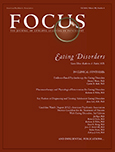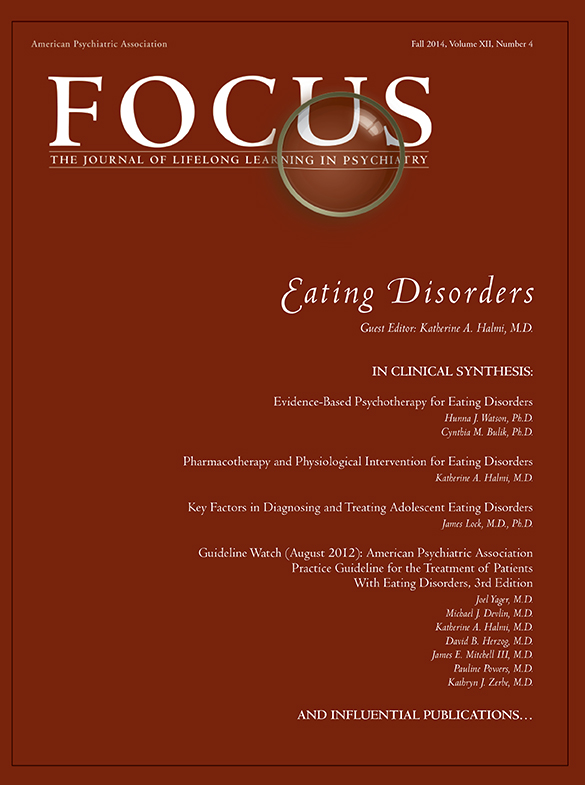A series of behavioral weight loss or very low calorie diet (VLCD) studies were conducted before the official
DSM-IV BED criteria were established. Consequently, these studies do not provide a stringent test of the current BED diagnostic criteria, but are worthy of brief mention. All three of these studies
59–61 categorized obese individuals into those with binge eating or those without binge eating, and examined the influence of this classification on behavioral weight loss or VLCD interventions. All three studies
59–61 failed to detect any classification-related effect on response to these treatments. As noted, the measures of binge eating used in these studies probably would overlap with the
DSM BED diagnosis, but are clearly not isomorphic with that construct. Yanovski et al.
62 did find that BED impacted several outcomes in VLCD interventions. For example, BED patients were more likely to drop out, display “extreme” deviations from the weight loss protocol, and also showed less weight loss in the refeeding phase of the VLCD. However compared to non-BED obese patients, BED individuals did not distinguish themselves in
overall adherence to the protocol, weight loss at the end of protocol, or weight loss at 1-year follow-up. BED subjects were more inclined to show substantial weight regain at 3-month follow-up, which was perceived as a negative outcome. However, Yanovski et al.’s
62 findings were not supported by two other studies, which found that BED was associated with
decreased likelihood of dropout from behavioral weight loss programs,
63,65 greater weight loss at the end of treatment, and to a lesser degree at the end of 1-year follow-ups. In a similar study, Raymond et al.
71 compared individuals with BED to individuals with subclinical BED or no binge eating in a VLCD weight loss program. They found no differences in weight loss at end of treatment, 1-year follow-up, or in the number of sessions completed by either group. This study is limited by the fact that subclinical binge eaters were included in the obese non-binge eater group, which may have obscured potential differences.
In a study of the impact of BED on weight loss in an effectiveness design, Pagoto et al.
68 examined the impact of a clinically derived BED diagnosis on weight loss in a 16-visit outpatient weight loss program. All patients (
n = 131) who enrolled in a weight loss program were included in the analysis. The sample was on average morbidly obese (average BMI = 43.08), and the obesity program was designed to prevent diabetes through lifestyle interventions. There was a significant effect of diagnosis on weight loss, with individuals exhibiting baseline BED diagnoses losing substantially less weight (weight change = −3.10%) when compared to obese individuals without BED (weight change = −5.35%). Furthermore, only 16% of the individuals with BED met the program goal of a 7% weight loss, which is substantially less than the total sample percentage of 31%. It is also worth noting that these researchers examined the effect of a diagnosis of major depression on weight loss, and found that individuals with major depression lost significantly less weight (
M = −5.28%) than individuals without major depression (
M = −3.29% weight loss). Also, this study reports that BED was not associated with dropout, whereas major depression was. In spite of the value of this study in terms of evidence that BED moderates weight loss, it failed to examine the predictive power of either BED or major depression when controlling for the other diagnosis. Therefore, the unique predictive power of BED, above and beyond major depression, was not tested.
As part of the Look Ahead trial, Gorin et al.
70 studied 5,145 individuals with Type 2 diabetes. All individuals had BMIs greater than 25 kg/m
2, and were randomized to either an intensive lifestyle intervention or a diabetes and support education treatment condition. The researchers used the Questionnaire of Eating and Weight Patterns to assess binge eating and classified 123 subjects as a BED group, whereas 4,222 subjects remained in the comparison group. In terms of weight loss, the intensive lifestyle group had a more favorable outcome than the diabetes support and education condition, regardless of BED status. Across treatment conditions, baseline BED diagnosis did not moderate outcome for either weight loss or reduction of risk factors for cardiovascular disease. The authors conducted more intensive analyses of binge eating behavior of subjects, and found that individuals who retained their BED diagnosis at the end of treatment lost considerably less weight than individuals who met criteria for baseline BED diagnosis but failed to meet diagnostic criteria at the end of treatment. They concluded that individuals with BED should not be discouraged from entering behavioral weight loss programs and, in fact, they noted the possibility that weight loss programs can improve binge eating. In other words, this study conveyed no data to support the role of BED as a moderator of treatment; however, the assessment study for BED represents a weakness, especially for diagnostic inferences.

